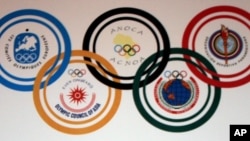The two cities in the running to host the Winter Olympics that Europe didn't want went on the charm offensive on Friday, hoping to convince Olympic delegates to award them the 2022 Games.
The bidding teams from Beijing and Almaty provided a sneak preview of their ambitious plans to host the Games with separate presentations at the Association of National Olympic Committees general assembly (ANOC) in Bangkok.
With Pyeonchang hosting the 2018 Winter Games and Tokyo the 2020 Summer Games, the odds of Asia getting a third successive Olympics had initially seemed remote.
But when the four European candidates -- Oslo, Stockholm, Krakow and Lviv -- all pulled out, mostly citing concerns about the astronomical costs involved, the 2022 Winter Olympics became a two-horse race between the two long-shots.
The Chinese capital, which hosted the Summer Olympics in 2008, is rapidly emerging as the heavy favorite because of its strong economy and proven record.
If Beijing succeeds it will become the first city to host the Summer and Winter Olympics -- both within 14 years -- and Chinese officials are sparing no expense trying to persuade the IOC to give them the nod.
In a demonstration of Beijing's commitment, the city's mayor Wang Anshun flew to Bangkok to head his team's bid presentation even though his home town is preparing to host the Asian Pacific Economic Co-operation Summit (APEC) summit, which will be attended by world leaders including U.S. President Barack Obama and Russian President Vladimir Putin.
Beijing's bidders have already swung into action, hiring a top American firm to handle their public relations and showing off a slick animation video that highlighted the Great Wall of China and the Forbidden City.
Wang said Beijing had the full backing of the Chinese government, a key requirement for the IOC, and most of the facilities were already in place from 2008.
Wang said the Games would take place from Feb. 4-20, the traditional time-slot for the Winter Olympics, and he highlighted the marketing opportunities of bringing the Games to China, telling the delegates that Beijing was a “secure, reliable and risk-free choice.”
Earlier in the day, Beijing's bid team held a news conference at one of Bangkok's best hotels, telling reporters the city had developed plans to improve its notorious air pollution, which it said would not present any problems to the athletes in the outdoor events in the mountains of Zhangjiakou and the indoor events, held in Beijing.
Almaty have maintained a relatively lower profile in the lead-up to next year's vote in Kuala Lumpur.
Their presentation was led by bid committee board member Ilya Urazakov and there was no media conference. Bid officials said they did not want to answer any questions from journalists.
The presentation focused heavily on the compact nature of Kazakhstan's bid. All of the venues are within a 35-kilometer radius and many of the venues were built when Almaty hosted the 2011 Asian Winter Games.
Urazakov said eight of the 13 venues are already in use and three more were being constructed for the 2017 Winter Universiade. Just two were dependent on winning the Games.
“This will be the most compact Winter Olympics in the last 30 years,” he said.
“We are aiming to build a new winter sports hub in the central Asian region.”
The IOC will announce the winner on July 31, 2015.





